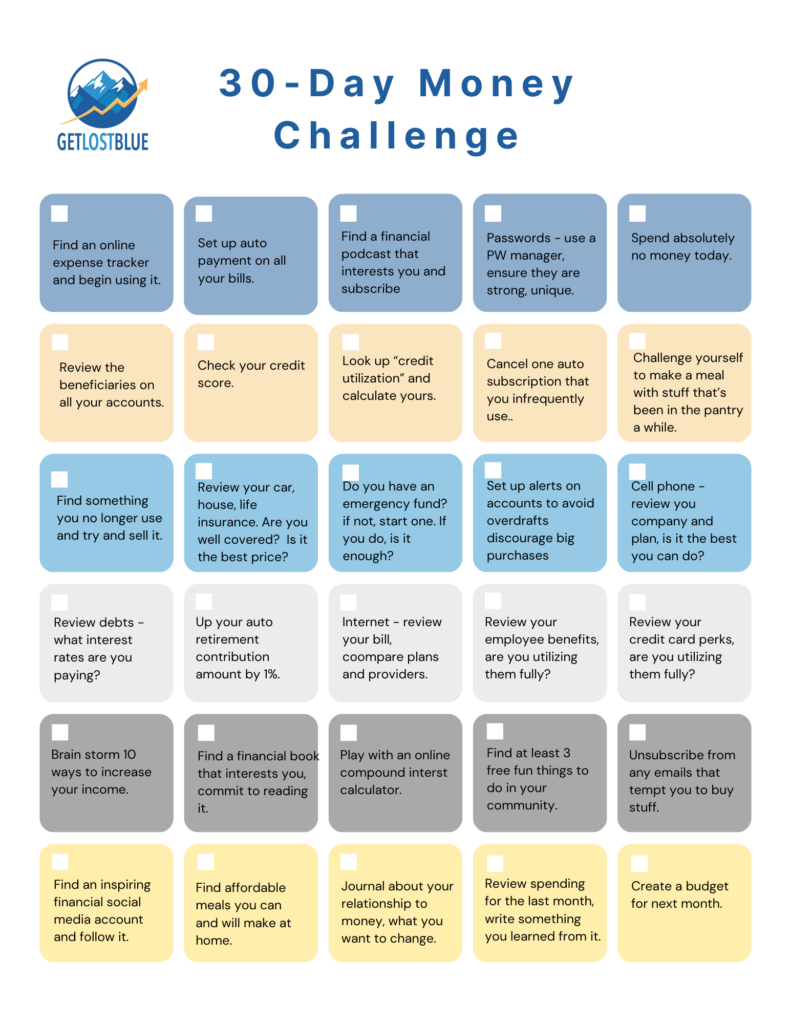Broccoli, that little green tree of health and righteousness. You’ve been told since childhood that it’s a superfood, loaded with vitamins minerals that are essential for good health.
And yet, when faced with a choice, you reach for french fries.
Budgeting is the brocolli of financial health. You know its good for you, and yet you still don’t do it.
Why? Because knowing what’s good for us and doing it are two very different skill sets.
Sound familiar? You’re not a natural born budgeter, or broccoli eater. And a life of no french fries and fiscal perfection sounds terrible. But you are tired of being stressed out about money!
What can you do?
You can trick yourself into budgeting through understanding and using the same human nature that makes us crave the fries!
And don’t worry, a budgeted life doesn’t have to be terrible.
Like healthy people who eat their broccoli most days, get to splurge some days. Likewise, once you’re in good fiscal shape, you don’t have to budget perfectly! You will literally be able to afford a stress free splurge now and then!
So, let’s talk about how to develop a taste for budgeting.
Hardwired to Eat the Fries, But We Don’t Have To!
Humans are hardwired to prioritize immediate gratification over long-term rewards. Behavioral psychologists call this present bias. We overvalue what we can have right now and undervalue benefits that come later.
For example, if you could have $100 today, or $110 next month, what would you chooser? That’s a garuanteed 10% in 30 days – pretty good, right? Well, you’d be in the majority if chose to take the $100 today.
Overcoming our hardwired instant gratification tendencies might feel like an uphill battle, but it’s entirely possible. Humans do it all the time. Our brains may seek short-term rewards, but they’re also remarkably adaptable. If not, we would all still be in diapers acting like toddlers.
Through reframing how we view rewards, we can trigger the same dopamine response that comes from instant gratification with progress toward meaningful long-term goals. The trick is to shift the focus, pairing those bigger, future rewards with immediate, smaller incentives along the way.
Let’s break down how to train your brain to crave budgeting the way a broccoli lover craves a roasted veggie platter.

Start with Small, Palatable Portions
Just as a broccoli hater isn’t going to dive into a giant bowl of raw florets, a budgeting newbie shouldn’t try to track every expense from Day One. Small, manageable steps are critical to building new habits.
- The Concept: Set a single, reasonably easy to achieve goal to start.
- Why It Works: This reduces overwhelm and lets your brain experience a quick win. Wins release dopamine, reinforcing the behavior and making you want to do it again.
Examples:
- Focus on just one category, like dining out, for the first month. And make your goal achievable! Say, eat out one less time, or spend 1% less.
- Set up an autotransfer from checking to saving for a small amount. Just ten bucks even! Celebrate if you don’t move it back into checking at the end of the month.
Pair Budgeting with a Reward
Kids learn to tolerate broccoli when it’s served with cheese sauce. Similarly, you can learn to tolerate budgeting by associating it with something enjoyable.
- The Concept: Add a small, immediate reward every time you work on your budget.
- Why It Works: Immediate rewards are more motivating than delayed ones. If your brain gets a treat now, it’s more likely to repeat the behavior later.
Examples:
- Enjoy the fancy coffee you save for special occasions while reviewing your budget.
- Save the new episode of your latest streaming addiction to watch right after setting up your small budgeting goal for the week.
Reframe the Narrative
What you tell yourself matters! You can control your internal dialogue around budgeting and what it means to you. Choose the story you tell yourself wisely. You can choose to tell yourself broccoli is a punishment – or, it’s a superfood that fuels your body. Similarly, budgeting is deprivation – or it’s empowerment.
- The Concept: Shift your mindset about what budgeting means. Instead of focusing on what you’re giving up, focus on what you’re gaining: control, peace of mind, and the ability to afford what really matters.
- Why It Works: Reframing your perspective reduces resistance to change and increases long-term commitment.
Examples:
- Think of your budget as the roadmap that enables you to afford the things you truly value, like travel, a home of your own, or financial independence. So, you’re not missing out on $100 dinner out tonight, you’re funding that $1000 weekend getaway later.
- Reframe budgeting as an act of self-care. You’re being nice to your future self, ensuring a more stress-free and secure life for her.
Create an Environment That Supports the Habit
No one reaches for broccoli if the pantry is stocked with chips and cookies. Likewise, if your financial tools are buried under a pile of temptation, budgeting will feel impossible.
- The Concept: Designing your environment to minimize temptation and support the habit you’re trying to develop.
- Why It Works: Environmental cues guide decision-making, and self-discipline only goes so far.
Examples:
- Set up automatic savings transfers to take the decision out of your hands.
- Use apps like Empower or Monarch to make tracking spending automatic and easy.
- Unsubscribe from emails, social media accounts, take apps off your phone that tempt you to spend impulsively.
Build a Routine
Taste buds adapt with repetition. The more you eat broccoli, the less you notice its bitterness. Budgeting is no different. Consistency rewires your brain. And the best way to build a consistent habit is to pair it with a habit you already have!
- The Concept: Repetition strengthens neural pathways that make behaviors a habit, and our brains like building habits.
- Why It Works: Its our human nature to be creatures of habit. We all already have tons of habits! Like building a tower, we can “stack” a new one on top of an existing one.
Examples:
- Set a calendar reminder to review your budget every Sunday, while enjoying your favorite Sunday ritual. Always do brunch? Add on a 5 minute budget review to your existing routine. Now you will associate waffles and canalope with small budget wins.
- Spend two minutes each morning checking your bank account balance while you wait for your kuerig to spit out your morning brew. You know you stand there looking at your phone anyway!
Embrace the Imperfection
Even the most dedicated broccoli lover indulges in fries occasionally, and that’s okay. Humans aren’t perfect decision-makers, we are emotional and irrational beings from time to time. There is no straight path to the goal line. What matters is that the trend is getting your closer to where you want to be.
- The Concept: Allow room for mistakes and indulgences in your budget.
- Why It Works: All-or-nothing thinking leads to burnout. Giving yourself grace, planning for imperfection, keeps you motivated for the long haul.
Examples:
- You budget $2,000 for a vacation but spend $2,500 because an unexpected opportunity arose for a last-minute excursion. Instead of seeing it as a failure, you simply adjust your budget for the following months to make up the difference. Affording memorable experiences are part of why you budget in the first place, right!
- You’ve been doing great sticking to your budget, but one stressful day leads to an unplanned $100 splurge on something regrettable. Rather than scrapping the whole budget, forgive yourself and move on. Learning experiences are valuable, after all! Use it to build a better plan to cope with stress in the future.
Financial Taste Buds Transformed

Developing a taste for budgeting, like learning to love broccoli, takes time and a bit of clever strategy. Start small, reward yourself often, and create an environment that makes success easier.
Sure, it might feel awkward or restrictive at first, but those little wins, like hitting a savings goal or finally paying off a credit card, start to feel like fuel to keep going.
I’ll be honest, when I started budgeting, it felt like a chore I wanted to avoid. But over time, something shifted. I stopped seeing it as a limit on my life and started seeing it as a tool for freedom.
These days, it’s just something I do, like brushing my teeth or fastening my seatbelt.
I don’t do it perfectly, and you don’t have to either. Just like you don’t need to eat broccoli every day to be healthy, you don’t need to follow your budget flawlessly to reap the benefits. The goal is progress, not perfection.
And trust me, progress tastes delicious!
Live a Life You Love
Tired of feeling stuck? Let’s create your escape plan. Schedule your free session today.
Or, get my easy-to-follow Money Challenge – transform your finances in Just 30 Days!

- Simple
- Actionable
- Empowering


Leave a Reply